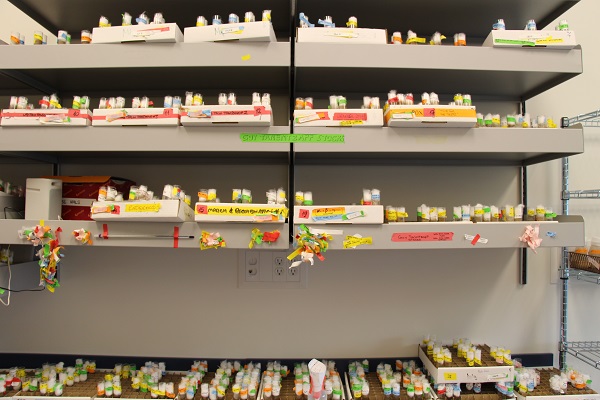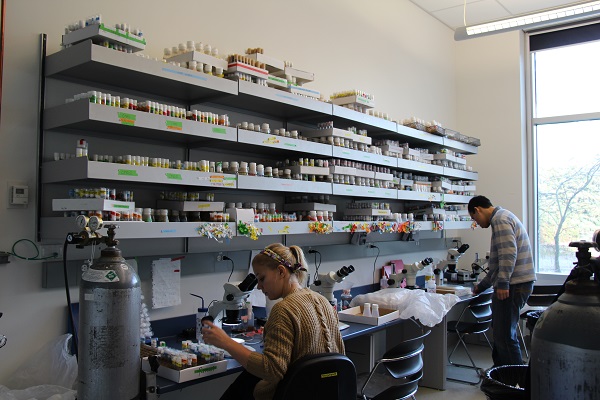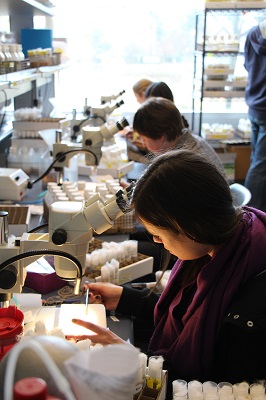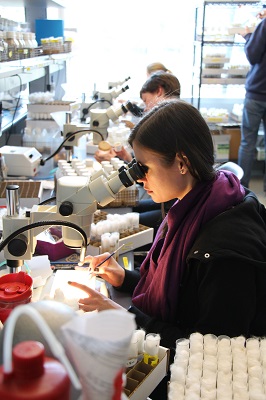Health Themes
Neuroscience

It is estimated that within the next 20 years, neurodegenerative and psychiatric disease will become the leading cause of death and disability in Canada. Members of the Neuroscience Research Group in the Life Sciences Institute are dedicated to furthering our understanding of how the nervous system develops and functions and how it is modified by injury and disease as well as by genetic and environmental factors. Together, we endeavor to understand the fundamentals of nervous system development and to identify the underlying causes of neurological conditions including Alzheimer’s disease, Schizophrenia, Stroke, Stress, Brain Tumours and Fetal Alcohol Syndrome. Our combined research is aimed at the development of future therapeutic applications for treatment of these disorders.
Faculty:
Professor
778-235-3555
doug.allan@ubc.ca
Professor
604-822-8746
shernaz.bamji@ubc.ca
Associate Professor
604-822-3463
mark.cembrowski@ubc.ca
Professor
604-822-7187
james.d.johnson@ubc.ca
Associate Professor
604-822-7882
hakima.moukhles@ubc.ca
Professor
604-822-9759
timothy.oconnor@ubc.ca
Professor
604-822-3899
victor.viau@ubc.ca
Regenerative Medicine
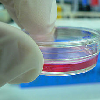
Over the last few decades tremendous medical breakthroughs have taken places towards harvesting the incredible promise of cell therapy as well as the regenerative potential of the human body. Researchers in our department are involved in cutting edge work in the fields of stem cell & regenerative medicine. The mission of the stem cell researchers in our department is to conduct world-class multi-disciplinary research aimed at furthering our search for exciting medical breakthroughs in this field.
Faculty:
Professor
604-822-7187
james.d.johnson@ubc.ca
Professor
604-822-2156
tim.kieffer@ubc.ca
Professor
604-877-4334
tanentz@mail.ubc.ca
Professor
604-822-5833
t.michael.underhill@ubc.ca
Cancer
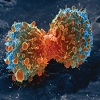
A number of faculty members in the Dept of Cellular and Physiological Sciences are working to translate their laboratories’ fundamental findings into novel anti-cancer therapies with low toxicity. Dr.Nabi is utilizing the soluble compound AMF, which his group has characterized at the molecular level, as a novel delivery vehicle to specifically target cancer cells with chemotherapy drugs and thus decrease toxic side effects in normal tissues. Dr. Roskelley is generating non-toxic compounds that block the activity of the cell surface molecule podocalyxin, which his group has shown is involved in breast and ovarian cancer progression. Dr. Johnson, whose group has characterized how metabolism is regulated in the normal and diabetic pancreas, is now working to determine how modifying the metabolic load affects pancreatic cancer progression. Dr. Loewen, who has worked out the molecular specifics of acid-based metabolic signaling in yeast cells is now determining how such signaling can be manipulated to slow the growth of human cancer cells. In addition, Dr. Underhill, who has identified a novel population of ‘mesenchymal’ stem cells that surround developing tumors, is now developing strategies to modify the function and number of these stem cells to shrink tumors, also in a non-toxic manner.
Faculty:
Professor
604-822-7187
james.d.johnson@ubc.ca
Associate Professor
604-827-0626
janelk@mail.ubc.ca
Professor
604-827-5961
christopher.loewen@ubc.ca
Professor
604-822-7000
ivan.robert.nabi@ubc.ca
Professor
604-822-0779
calvin.roskelley@ubc.ca
Professor
604-822-5833
t.michael.underhill@ubc.ca
Cardiovascular

Cardiovascular disease is the most common cause of hospitalization and death for those over 65, and the number two cause for those between the ages of 35 and 64. The Cardiovascular Research Group in the Life Sciences Institute is composed of a group of scientists dedicated to solving these problems. We are studying how the heart generates and maintains its regular beat, and how the heart controls its force of contraction. This research directly impacts our understanding and treatment of arrhythmia, atrial fibrillation and heart failure. Since our scientists have direct connections to local biotechnology companies, we ensure that the discoveries are transferred, as rapidly as possible, to the bedside and the clinic.
Faculty:
Associate Professor
604-822-2568
eric.accili@ubc.ca
Professor
604-822-7187
james.d.johnson@ubc.ca
Professor & Department Head
604-822-3423
edwin.moore@ubc.ca
Cell and Developmental Biology
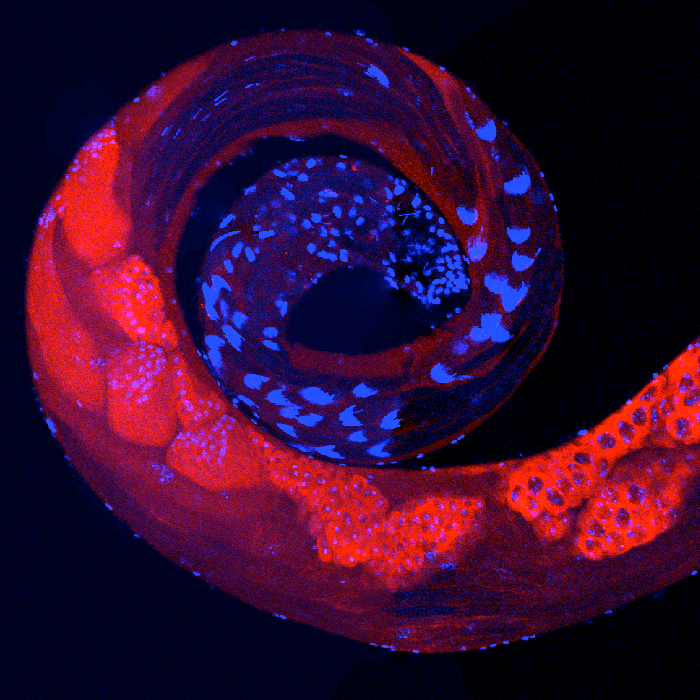
We focus on how single cells integrate signals and differentiate into complex multicellular organisms and tissues. The goal of CELL is to understand the fundamental nature of these cellular interactions and to consider how these interactions may be disturbed in various developmental disorders. Of particular interest to CELL is to understand the development of the nervous system and to identify the underlying causes of neurological disorders like Epilepsy, Alzheimer’s disease, Schizophrenia, Stroke and Fetal Alcohol Syndrome, as well as uncovering the molecular defects that cause congenital problems in nervous system development. Researchers in CELL have developed sophisticated animal model systems that mimic these disease syndromes and use the state of the art Centre for Disease Modeling that is an integral part of the LSI infrastructure. Our combined research efforts to uncover fundamental mechanisms of development and to discover the etiology of neuronal disease is aimed at the development of future therapeutic applications for treatment of these disorders.
Faculty:
Associate Professor
604-827-0626
janelk@mail.ubc.ca
Professor
604-827-5961
christopher.loewen@ubc.ca
Professor
604-822-7000
ivan.robert.nabi@ubc.ca
Professor
604-822-0779
calvin.roskelley@ubc.ca
Professor
604-877-4334
tanentz@mail.ubc.ca
Professor
604-822-5833
t.michael.underhill@ubc.ca
Assistant Professor
604-827-6293
hilla.weidberg@ubc.ca
Diabetes & Obesity

There are approximately 200 million people in the world with diabetes, including more than 2 million Canadians. The total economic burden of managing diabetic Canadians is over $13 billion per year. These figures are expected to escalate dramatically given the recent rise in childhood obesity and strong association of obesity with diabetes (80% of diabetics are obese). Indeed it has been estimated that 1 in 3 American children born in the year 2000 will develop diabetes. Despite the life saving discovery of insulin by Canadians in the 1920’s, diabetics still suffer from debilitating complications of the disease and typically live 15 years less than people without diabetes. The mission of the new UBC Diabetes and Obesity Group that will form in the Life Sciences Centre is to conduct world-class multi-disciplinary research aimed at understanding the underlying causes and ultimately finding cures for obesity and diabetes.
Faculty:
Professor
604-822-7187
james.d.johnson@ubc.ca
Professor
604-822-2156
tim.kieffer@ubc.ca
Associate Professor
604-822-0623
elizabeth.rideout@ubc.ca
Scientific Approaches
Biophysics
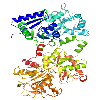
Biophysics is an interdisciplinary science that uses the methods of, and theories from physics to study biological systems. Researchers in our department use the tools of biophysics to address fundamental questions about the functioning of the human body. One example of how biophysical tools are used by our researchers is to study ion channels that regulate how the heart generates and maintains its regular beat, and how the heart controls its force of contraction. This research directly impacts our understanding and treatment of arrhythmia, atrial fibrillation and heart failure.
Faculty:
Associate Professor
604-822-2568
eric.accili@ubc.ca
Systems Biology
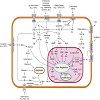
Systems biology is an emerging approach applied to biomedical and biological scientific research. Systems biology is a biology-based inter-disciplinary field of study that focuses on complex interactions within biological systems, using a more holistic approach to biological and biomedical research. Systems biology has revolutionized how modern researchers approach the study of disease. Systems biologists utilize tools from a diverse range of fields and expertise: quantitative biology, high resolution and quantitative imaging, structural biology, genomics, proteomics, mathematical modelling, materials science, network analysis, and many other disciplines.
Faculty:
Professor
604-822-2330
kurt.haas@ubc.ca
Professor
604-822-7187
james.d.johnson@ubc.ca
Professor
604-822-2156
tim.kieffer@ubc.ca
Professor
604-827-5961
christopher.loewen@ubc.ca
Professor
604-822-7000
ivan.robert.nabi@ubc.ca
Professor
604-877-4334
tanentz@mail.ubc.ca
Professor
604-822-5833
t.michael.underhill@ubc.ca
Cell Biology
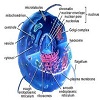
Cell biology is a scientific discipline that studies cells – their physiological properties, their structure, the organelles they contain, interactions with their environment, their life cycle, division and death. Researchers in our department who study cell biology study cells on both a microscopic and molecular level. Cell biological approaches provide detailed molecular insight into the mechanism that underlie complex disease processes.
Faculty:
Professor
604-822-8746
shernaz.bamji@ubc.ca
Professor
604-822-7187
james.d.johnson@ubc.ca
Associate Professor
604-827-0626
janelk@mail.ubc.ca
Professor
604-827-5961
christopher.loewen@ubc.ca
Associate Professor
604-822-7882
hakima.moukhles@ubc.ca
Professor
604-822-7000
ivan.robert.nabi@ubc.ca
Professor
604-822-9759
timothy.oconnor@ubc.ca
Professor
604-822-0779
calvin.roskelley@ubc.ca
Professor
604-877-4334
tanentz@mail.ubc.ca
Professor
604-822-5833
t.michael.underhill@ubc.ca
Imaging
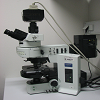
Researchers in our department utilize a diverse array of high resolution and quantitative imaging methods in both fixed and living tissues to gain insight into how cells and tissues function . This information can be used to understand the mechanisms that underlie various diseases and help in the design of promising therapies.
Faculty:
Professor
778-235-3555
doug.allan@ubc.ca
Professor
604-822-8746
shernaz.bamji@ubc.ca
Professor
604-822-2330
kurt.haas@ubc.ca
Professor
604-822-7187
james.d.johnson@ubc.ca
Professor
604-822-2156
tim.kieffer@ubc.ca
Professor & Department Head
604-822-3423
edwin.moore@ubc.ca
Professor
604-877-4334
tanentz@mail.ubc.ca
Professor
604-822-5833
t.michael.underhill@ubc.ca
Genomics/Proteomics
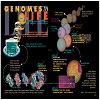
Genomics is a discipline in genetics that applies recombinant DNA, DNA sequencing methods, and bioinformatics to sequence, assemble, and analyze the function and structure of genomes (the complete set of DNA within a single cell of an organism). Proteomics is the large-scale study of proteins, particularly their structures and functions. Researchers in our department utilize genomics and proteomics to gain basic insight into the functioning of biological systems and to try and uncover the mechanisms that underlie complex diseases. The knowledge gained from the use of genomics and proteomics can be translated into potential therapies for such diseases.
Faculty:
Professor
778-235-3555
doug.allan@ubc.ca
Professor
604-822-7187
james.d.johnson@ubc.ca
Professor
604-827-5961
christopher.loewen@ubc.ca
Professor
604-822-7000
ivan.robert.nabi@ubc.ca
Professor
604-822-5833
t.michael.underhill@ubc.ca
Model Organisms
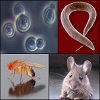
Researchers in our department use genetic model organisms to gain insight into the fundamental mechanisms of basic biological functions in the human body. Using genetic disease models this research can lead to increased understanding and the development of treatments for a range of diseases.
Faculty:
Mice:
Professor
604-822-8746
shernaz.bamji@ubc.ca
Professor
604-822-7187
james.d.johnson@ubc.ca
Professor
604-822-2156
tim.kieffer@ubc.ca
Associate Professor
604-827-0626
janelk@mail.ubc.ca
Professor
604-822-0779
calvin.roskelley@ubc.ca
Professor
604-822-5833
t.michael.underhill@ubc.ca
Yeast:
Professor
604-827-5961
christopher.loewen@ubc.ca
Drosophila (fruit flies):
Professor
778-235-3555
doug.allan@ubc.ca
Professor
604-822-9759
timothy.oconnor@ubc.ca
Associate Professor
604-822-0623
elizabeth.rideout@ubc.ca
Professor
604-877-4334
tanentz@mail.ubc.ca
Zebrafish:
Professor
604-822-2156
tim.kieffer@ubc.ca
Resources
Imaging
Genomics/Proteomics

Genomics is a discipline in genetics that applies recombinant DNA, DNA sequencing methods, and bioinformatics to sequence, assemble, and analyze the function and structure of genomes (the complete set of DNA within a single cell of an organism). Proteomics is the large-scale study of proteins, particularly their structures and functions. Researchers in our department utilize genomics and proteomics to gain basic insight into the functioning of biological systems and to try and uncover the mechanisms that underlie complex diseases. The knowledge gained from the use of genomics and proteomics can be translated into potential therapies for such diseases.
Faculty:
Professor
778-235-3555
doug.allan@ubc.ca
Professor
604-822-7187
james.d.johnson@ubc.ca
Professor
604-827-5961
christopher.loewen@ubc.ca
Professor
604-822-7000
ivan.robert.nabi@ubc.ca
Professor
604-822-5833
t.michael.underhill@ubc.ca
Electrophysiology
Drosophila Facility
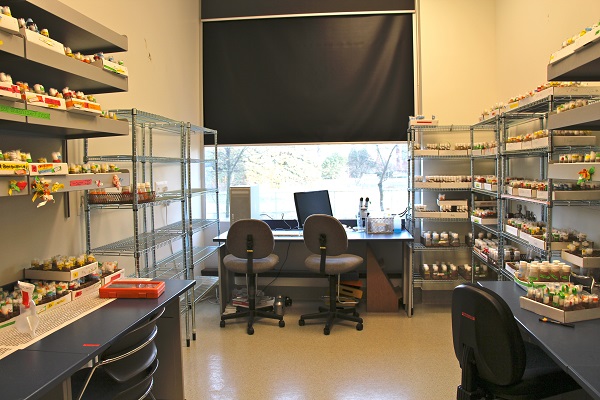
The LSI Drosophila Facility brings together all UBC Drosophila researchers into a single fully-equipped laboratory area (~1500sq.ft) dedicated to housing and ‘pushing’ flies. The Facility has ~16 fly-pushing stations with microscopes and centrally-piped CO2, four large environment rooms for housing strains at stable temperature and humidity, a fume hood for mutagenesis, and numerous single lab stock rooms for the isolated storage of lab strains. The Facility also has a fully-equipped kitchen for making fly food, including a 50L steam kettle and Droso-Fillers for rapidly cooking large batches of fly food. The Facility is situated next door to the LSI Flow Cytometry Core Unit that greatly facilitates cell sorting from Drosophila.
There are currently six Drosophila labs that utilize the Drosophila Facility (Drs. Allan, Auld, Brock, Gordon, Grigliatti, Tanentzapf), as well as three collaborating labs (Drs. Accili, Numata, O’Connor) that take advantage of Drosophila in specific lab projects. These researchers have well-funded research programs focusing on fundamental mechanisms of gene regulation, neural circuitry and physiology, behavior and the mechanisms of cell adhesion in development and disease.
As a focal point for these laboratories to house and ‘push’ their flies, this Facility offers a uniquely collaborative and lively environment that truly enhances inter-lab interaction, exposes trainees to a wide range of Drosophila techniques and promotes open sharing of technical and intellectual resources.
